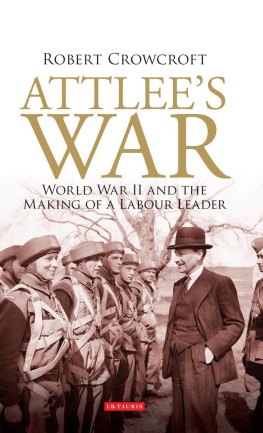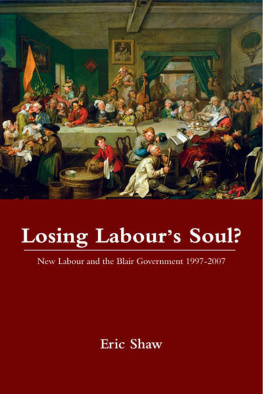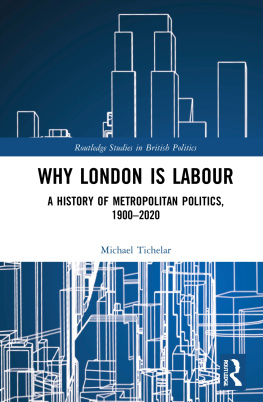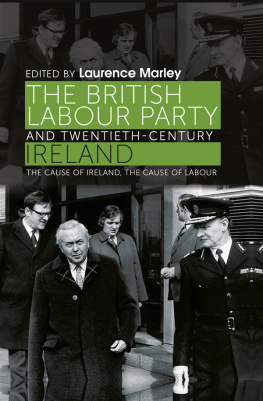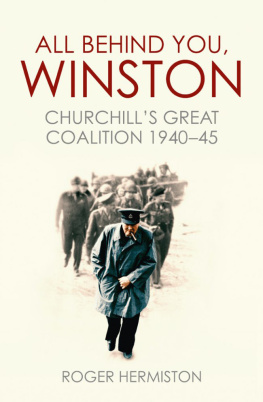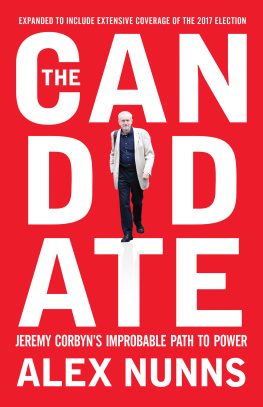Robert Crowcroft is Lecturer in Contemporary History at the University of Edinburgh. He completed his Ph.D. at the University of Leeds in 2007. He is the co-editor of The Philosophy, Politics and Religion of British Democracy (I.B.Tauris).

Published in 2011 by I.B.Tauris & Co Ltd
6 Salem Road, London W2 4BU
175 Fifth Avenue, New York NY 10010
www.ibtauris.com
Distributed in the United States and Canada Exclusively by Palgrave Macmillan, 175 Fifth Avenue, New York, NY 10010
Copyright 2011 Robert Crowcroft
The right of Robert Crowcroft to be identified as author of this work has been asserted by the author in accordance with the Copyright, Designs and Patents Act 1988.
All rights reserved. Except for brief quotations in a review, this book, or any part thereof, may not be reproduced, stored in or introduced into a retrieval system, or transmitted, in any form or by any means, electronic, mechanical, photocopying, recording or otherwise, without the prior written permission of the publisher.
International Library of Twentieth Century History 41
ISBN: 978 1 84885 286 0
eISBN: 978 0 85773 002 2
A full CIP record for this book is available from the British Library
A full CIP record for this book is available from the Library of Congress
Library of Congress catalog card: available
Camera-ready copy supplied by
Oxford Publishing Services, Oxford
Abbreviations
AEU | Amalgamated Engineering Union |
AHRC | Arts and Humanities Research Council |
CPGB | Communist Party of Great Britain |
HC | House of Commons |
LCC | London County Council |
LLP | London Labour Party |
LPACR | Labour Party Annual Conference Report |
LSE | London School of Economics |
MFGB | Miners Federation of Great Britain |
NCL | National Council of Labour |
NEC | National Executive Committee |
NHS | National Health Service |
NUDAW | National Union of Shop Distributive and Allied Workers |
NUR | National Union of Railwaymen |
PLP | Parliamentary Labour Party |
RAF | Royal Air Force |
TGWU | Transport and General Workers Union |
TUC | Trades Union Congress |
USSR | Union of Soviet Socialist Republics |
VE Day | Victory in Europe Day (8 May 1945) |
Acknowledgements
This book grew out of a Ph.D. on Labour Party politics between 1939 and 1945. In my view, one problem with our impressions of Westminster during the war and this has solidified into a conviction in the process of adapting the thesis into a book lies in the texture of the previous literature. Most of those works take on a markedly sunny and cheerful hue. Wartime politics comes to appear overly optimistic. To me, the documents convey a very different impression: it is of dark, swirling, forces at work, endless uncertainty and political titans doing battle. The period is at once oppressive and exhilarating. Frankly, it has always felt utterly Wagnerian in its atmospherics. I hope that this monograph captures one aspect of that story the rise of Clement Attlee to a position of pre-eminence in the British polity.
I take this opportunity to thank the various archivists and library staff who helped to facilitate the research, as well as the bright sparks at the National Archives who put the Cabinet papers for 1939 to 1945 online, a genuinely invaluable resource. Let us all hope that the online national records are expanded further in the years to come. The AHRC generously funded my Ph.D. over three years, for which I express my gratitude. Ms Joanna Godfrey at I.B.Tauris has consistently been a fantastic source of help as my editor. Professor Kevin Theakston and Professor Philip Williamson examined the Ph.D. thesis, and the former gave helpful advice on the adapted version. I am deeply indebted to Professor John Charmley for comments on the manuscript and other acts of generosity. I should also express my affection to students and former students some of them now good friends who offered amusement and stimulation, especially Mr Thomas Dawn and Mr David Lyons. Teaching is a unique pleasure (why so many people do not like doing it is baffling to me), and I have always treasured the weekly doses of outrage and the shredding of the liberal and peacenik conscience.
I would like to thank Dr Simon Green, Professor Andrew Thorpe, Dr Jeremy Smith and Ms Maria Di Stefano for various kindnesses. I will always be grateful to my old secondary school History teacher, Mr Paul Allen, for sparking my interest in the subject in the first place through his wonderful classes. Without him, I would not be writing this now. I owe a great deal to Mr Lee Bruce for his unfailing friendship as well as his comments on an earlier draft of the manuscript. By far my largest intellectual debt is to my former supervisors, Dr Owen Hartley and Professor Richard Whiting, who have acted as inspiring mentors and friends. Each also offered insightful suggestions to improve the text.
But my oldest, and deepest, debt is owed to my mother and my grandparents. I can never begin to repay it, but this book is a small token of my affection.
Introduction
In July 1945 the Labour Party secured its first ever majority in Parliament and formed a government that remains, depending on ones perspective, either the finest or the most destructive in the twentieth-century history of these islands. Major reforms economic, industrial and social were enacted and the powers of the British state expanded to reflect a new faith in the ability of government to solve problems once believed intractable. The Prime Minister of that government, Labour leader Clement Attlee, became a political legend. His only modern peers in that regard are Winston Churchill and Margaret Thatcher. Attlee was recently voted the most successful Prime Minister of the twentieth-century,
But the position that Labour won in 1945 did not just fall into its lap; the party and its leaders had played a critical role in the Churchill coalition ministry that guided Britain through the Second World War. Previously, nearly all political historians have explored whether the conflict facilitated a policy consensus between Labour and the Conservatives on a mixed economy and an expanded welfare state that lasted until the election of Mrs Thatcher in 1979.
This book offers a fresh perspective on wartime politics by concentrating attention for the first time on the extent to which the years 1939 to 1945 marked a decisive political shift towards the Labour Party, and the role in that process of Attlee. The shift in question was much more than controversial policies like state intervention in industry coming to be regarded as common sense under the pressures of war. It instead represented a fundamental realignment of British politics. It was, moreover, a transformation driven through by the Labour leaders themselves, particularly the much maligned and misunderstood Attlee. As such, the book poses questions that allow the familiar landmarks of this period to be analysed in new ways. Labours impact on the political world was fundamental and systemic. Attlee and other colleagues in the Churchill coalition particularly union boss Ernest Bevin, the wartime Minister of Labour, and Attlees great rival Herbert Morrison, the Home Secretary assumed the central role in a reconstruction of the British state and the establishment of new doctrines and practices under which the country was governed. The apparatus and boundaries of government were hugely expanded. The transformation these men wrought had an impact that lasted much longer than just one generation of Labour leaders; the legacy of their wartime activities remained in place until at least 1979 and arguably afterwards. Moreover, Attlee was personally central to achieving this change in his partys fortunes. His leadership style consistently elusive to historians enabled Labour to dominate party politics between 1939 and 1945. In fact, Attlees ascendancy within the government and over his own party was possibly the most significant force in shaping the entire direction of wartime politics. He played the principal role in enhancing Labours negotiating position for office in the phoney war of September 1939 to May 1940, and secured considerable leverage for the party with the formation of the Churchill coalition. Between 1941 and 1945 Attlee led the way in a revolution in British government and the growth of the state; he helped guide the coalition in the direction of new, and social-democratic, politics; and he was the most energetic figure from either party in seeking to bolster the electoral arrangements that underpinned the structures of cross-party alliance. None of this has been recognized by historians, who have downplayed Attlees importance during the war. Reassessment of this alters our perception of the period as a whole.

